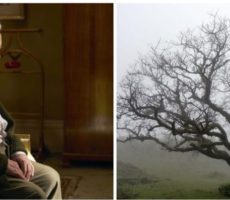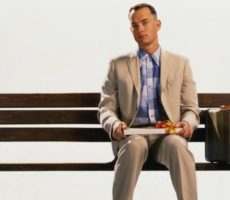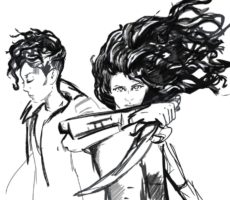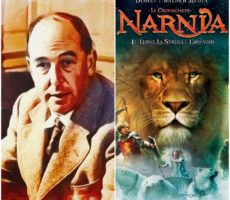It is a sunny morning, and Hannah has just eaten breakfast. She is playing peek-a-boo with her baby daughter in the living room, basking in her crescent-eyed giggles. Her son is building another LEGO contraption in his bedroom, intermittently calling out: ‘Mummy, come check this out!’ Her dog is chewing a rubber bone at her feet. For a moment, life feels perfectly happy.
Then in her peripheral vision she sees her mobile phone light up. Her heart does a little gallop, as it usually does when he calls.
She reluctantly pulls herself away from her baby, who is now old enough to sit up by herself on the carpeted floor, surrounded by plush cushions. She answers the call.
“Hello, Dad?” She tries to sound upbeat.
“Hannah?”
She recognizes that tone, and braces herself. “What’s the matter?”
She can hear his panicked breathing. “I was making my way to see Dr. Lam. Been there a hundred times. But…But I got down here at the lobby, and then my mind just went blank. I…I lost any sense of direction. I don’t know where to go. So…So I’m going back home now. I’m going back up now.”
Hannah closes her eyes. It is happening again. Another episode.
She takes a deep breath. “OK, don’t panic. Just go back home, sit down, and drink some water. Where is Mary?” She is the domestic helper.
“I don’t know where she’s gone,” he says hoarsely. Hannah glances at the clock and guesses Mary is probably at the wet market. Her father can never keep track.
“OK, just wait until she gets back. I’ll call her and tell her to hurry back. Do you feel any physical discomfort?” Hannah worries that he might be having a minor stroke. His speech isn’t slurred, and he can still formulate sentences. But he seems to be having more difficulty retrieving words, his pauses longer, and this time his confusion and disorientation seem worse.
He says he doesn’t feel any pain. “But I’m all muddled, Hannah. I can’t…I can’t think.”
“Don’t worry about the appointment with Dr. Lam,” Hannah reassures. “I’ll call him and ask to reschedule. You go to the clinic later with Mary, ok? Just stay put until she gets back.”
“What appointment?” He sounds perplexed. She can almost hear the cogs in his brain grind and groan.
“Dad, you made an appointment with Dr. Lam,” she says slowly. “You called me earlier this morning to tell me you had some pain in your right ear, so you wanted to have it checked out.”
He grunts. “I don’t remember that.” He pauses. “I tried calling your…your…what’s his name…”
“Ray?” Her older brother was probably in a meeting and couldn’t pick up.
“Yes, yes. Ray. But no answer.”
Hannah glances longingly at her baby daughter, who is now playing happily with some musical toys, occasionally looking over at mummy, who doesn’t realize she is frowning deeply, with the phone pressed to her ear. Hannah smiles at that sweet round face, blows a kiss, and walks into the hallway. Her son has started on a drawing, thankfully occupied. “It’s OK, Dad. Do you have a pen and paper there? Just write down the appointment time when I tell you later, alright?”
“What appointment?”
Hannah knows she shouldn’t, but she simmers a bit. “Dad. Your appointment with Dr. Lam. You told me you wanted to see him because of a pain in your right ear.”
“Oh. Did I? Right. Right. I just feel…I haven’t felt like this before. It’s like a virus has invaded my brain.” He talks as though this is the first time it’s happened.
Hannah glances at the clock. She has clients to see after lunch, and she had planned to spend the morning hanging out with the kids, with no distractions. But there is never enough time, and when you have an ailing parent, distraction-free is a luxury. “It’s OK. Stay calm, rest on the sofa, drink some water. I’ll call back.”
After two minutes, Hannah tells him that she had made an appointment with Dr. Lam for 1:30pm.
There is a long pause on his end. “Wait, what appointment? Why do I have to go see him?”
He calls back five or six more times, and he asks Hannah the same questions over and over again like a broken record. She spends the next hour trying to reassure him; and finally, blessedly, the mental fog lifts, and he is somewhat back to normal again.
That evening, Hannah is quieter than usual, and her husband notices. When she puts the children to bed she hugs them a little tighter, a little longer, breathing in the scent of their sweetness that she wants to cling to her forever. And when she goes to the dining table to eat with her husband, he opens his arms and she falls into them, spent, and she buries her face into his broad chest and weeps, grieving for what her father has become, and is becoming: the gradual devolving of this man who had once been such a giant to her, the gallant bread-winner who devoted himself to his family. Watching him gradually lose his mind, witnessing that slow erosion of his selfhood, has been more draining than she’d realized.
Based on research surveys, many would rather choose to be afflicted with diseases where one still gets to keep one’s mind intact, than be doomed with dementia: a cruel, incurable, degenerative disease that slowly and insidiously strips you of your identity, sanity, and dignity until you are nothing but a hollow shell of your former self. When faced with such a ghastly condition, we find ourselves mulling over the existential questions: Who are we without our memories that connect us to our loved ones, and our past and present? Who are we without a grasp on reality and the conviction of our values and beliefs that define the very essence of our being? I believe in the soul. But what happens to one’s soul as their very essence of selfhood sloughs off bit by bit?
Hannah’s father still recognizes his loved ones in the immediate family. He is still lucid enough to function without full-time nursing care, and his dementia hasn’t yet turned him into a total curmudgeon. But it is only a matter of time. The cracks of cognitive decline are getting bigger and deeper, the chasms of confusion and garbled memory growing wider and more insistent. He often forgets and struggles with the many small details of daily life that we, the unafflicted, manage without a second thought. He forgets what he had for lunch, or even whether he already had lunch; he has trouble taking the MTR because he gets easily disoriented and no longer comprehends even simple directions on a map; he often cannot recall his own address; and he relies on his helper to type text messages for him because he no longer knows how to do it. All these easy, auto-pilot actions for us have become insurmountable chores for him, causing extreme confusion, anxiety, and even insomnia. He relies on Hannah to manage every aspect of his life; yet he is oblivious to his incapacities, instead blaming others for everything he finds incomprehensible.
Hannah’s father has embarked on the process scientists call retrogenesis: a cognitive return to birth. Therein lies the tragic irony: as Hannah’s children continue to grow into adulthood, her father continues to deteriorate into toddlerhood. One day, he will no longer recognize Hannah. One day, he will no longer care about seeing his grandchildren, because he will forget that he has them.
The world is full of fascinating and wonderfully mind-boggling things, and every now and then I learn something that makes me pause and marvel at its sheer wonderment. I recently learned that when scientists look into a telescope, they are in fact looking into the past. Did you know that when we look up at the sun, we are not actually seeing the sun as it is in real-time? That we are actually seeing the sun as it WAS about eight minutes ago?
But what happens to our sense of self when we lose that ability to understand, when we are no longer able to learn and retain knowledge, think coherently, and marvel at beauty? I cannot imagine that terrifying, unknowable state of mind. David Shenk, author of The Forgetting: Alzheimer’s, Portrait of An Epidemic (2001) was spot-on when he said that dementia is essentially a radical slowing of death: “what is usually a quick flicker we see in super slow motion.” Amidst all of this, we ask ourselves: is an immutable self still intact behind the disease’s neurofibrillary tangles and amyloid plaques? How do you locate the selfhood in someone who is, for neurological reasons, no longer the person you knew? Beneath the chaos of garbled confusion and worsening cognitive decline, can we still find something in our loved one that is transcendently human?
This is why only imagination can probe that unknowable state of mind. Dementia has been the subject of many great works of journalism and memoir (Thomas DeBaggio’s “Losing My Mind: An Intimate Look at Life with Alzheimer’s,” John Bayley’s “Elegy for Iris,” and Diane Keaton’s “Then Again”, just to name a few), but ultimately we are left with questions that only good fiction can answer: What do those end stages feel like? What is it like to lose oneself and still live? Could there be some essential grain of personhood that survives until the end?
No matter how much we want to understand, mid-to late-stage sufferers, lost in their aphasia (the inability to verbally express oneself due to the loss of language skills), can’t articulate it to us. So fiction attempts to explain it for us. Films adapted from books about dementia such as Still Alice, The Notebook, Supernova and Iris move us so profoundly because they make us question what it means to be ourselves, and that inevitably raises potentially uncomfortable questions regarding the meaning of life and what makes us uniquely human. In the critically acclaimed film The Father, Sir Anthony Hopkins (for which he won the Best Actor Oscar in 2021) gives a heartrending performance as an elderly man suffering from advancing dementia. During the devastating final scene, as he grapples with late-stage Alzheimer’s, his character is talking to his nurse when he starts sobbing like a child: “Who exactly am I? I want my mommy. I want her to come and fetch me. I want to go home. I feel as if I’m losing all my leaves. I don’t know what’s happening anymore. I have nowhere to put my head down anymore. I know my watch is on my wrist. That I do know, for the journey.” And therein lies the incomparable beauty of fiction: A good writer finds the words to effectively explain things that we find difficult to understand or imagine. The powerfully evoking imagery of a tree losing its leaves until it is a skeletal phantom provides a haunting metaphor for the slow, ultimately all-consuming progression of dementia; that it is essentially a stripping away of one’s essence, and every little memory and piece of selfhood that is lost, is in fact felt inexplicably by the sufferer, in ways that cannot be adequately explained without resorting to the abstract and figurative.
It is Sunday, and Hannah has invited her father over for lunch. She watches as he plays with her baby daughter, and she sees the pure adoration in his eyes, the way his face lights up at his grand-daughter’s giggles and smiles. And then Hannah is struck by the redemptive realization that this golden moment is to be photographed and treasured: for her father is still in there. The tree hasn’t yet lost all its leaves. He can still love, and feel love. And perhaps, at the end of it all, that is the only thing that matters.
Kathryn Tse-Durham
Author of The Ellanor Chronicles
31st August 2021
This blog post is also posted on Kathryn’s Facebook Page. Visit here.










